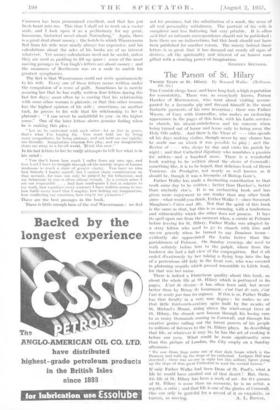The Parson of St. Hilary
Tilt; Cornish clergy have, and have long had, a high reputation for eccentricity. There was, as everybody knows, Parson Hawker of Morwenstow, who went about visiting acconi panied by a favourite pig and dressed himself in the most fantastic garments of his own invention ; there was Father Wason, of Cury with Gunwalloe, who makes an endearing appearance in the pages of this book, with his Latin services in church, his absent-mindedness and his concern when being turned out of house and home only to bring away the Holy Oils safely. And there is the Vicar of -- who spends all his days making violins, though never by any chance has he made one on which it was possible to play ; and the Rector of who sleeps by day and visits his parish by night ; and that Cathedral dignitary who nourishes a passion for adders—and a hundred more. There is a wonderful book waiting to be written about the clerus of Cornwall something like, it is to be hoped, that delicious book of Henri not nearly so well known as it Trarieux, Au Presbyt0e,
should be, though it was a favourite of Bishop Gore's.
Father Walke has made a fascinating contribution to that work some day to be written : better than Hawker's, better than anybody else's. It is an enchanting book and has given more enjoyment to one reader than any other book since—what would you think, Father Walke ?—since Somerset Maugham's Cakes and Ale. Not that the spirit of this book is the same as that, but this is as amusing, with a tenderness And whimsicality which the other does not possess. It lays its spell upon one from the moment when, a curate at Poiruan before leaving for St. Hilary, Father Walke was adopted by a stray kitten who used to go to church with him and rue-ow gravely when he turned to say Dominus tecum-- evidently she appreciated the Latin better than the parishioners of Polruan. On Sunday evenings she used to walk sedately before him to the pulpit, where from the bookrest she had a full view of the congregation. But it all ended disastrously by her taking a flying leap into the lap of a portentous old lady in the front row, who was covered in glistening sequhis which proved irresistible to Little Sotili for that was her name.
There is indeed a Franciscan quality about this book, as about the whole life at St. Hilary which is portrayed in its pages. L'art de chfcril'e- it has often been said, but never better than by Remy de Gourmont—c'est d'art de voir, c'est rant de senor par toms Its organcs. If this is so, Father 'Walke has that faculty in a very rare degree : he makes us - see
that little thirteenth-century spire built by the monks of St. Michael's Mount, rising above the wind-swept ,trees at St. Hilary, the church now known through his loving care to so many thousands coming to Cornwall, and through his creative genius calling out the latent powers of his people to millions of listeners to the St.' Hilary plays. In describing that life, or whatever it may be, he has the art of evoking it before our eyes. What could be more significantly seen than this picture of London, the City empty on a Sunday afternoon :
"'We saw Doan Ingo Come out of that dark house which is the Deanery and walk up the steps of his cathedral. Ludgate Hill was deserted ; there was no one in sight but this solitary figure going up the steps of that great Cathedral to read the second Lesson." If only Father Walke had been Dean of St. Paul's, what a life he would have created out of that desert ! But, there, his life at St. Hilary has been a work of art—for the parson of St. Hilary is more than an eccentric; he is an artist, a mystic, a saint ; and that life is One of the glories of Cornwall. One can only be grateful for a record of it so exquisite, so






































 Previous page
Previous page